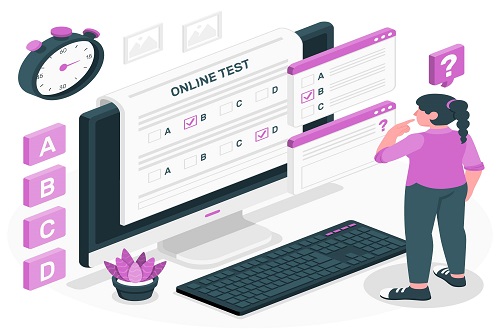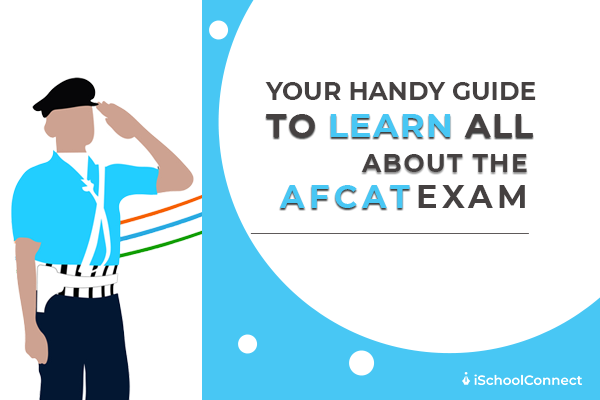Table of Contents
AFCAT exam | An overview
The Air Force Common Admission Test, or AFCAT, is an entrance examination conducted by the Indian Air Force for aspirants who want to serve India as an air warriors. AFCAT is one of the most sought-after military exams in the country, and every year, lakhs of aspirants apply for it. As a matter of fact, the Indian Air Force conducts the AFCAT exam twice a year – once in Feb and the other somewhere in August-September.
A little more about the exam
The exam is conducted to select eligible candidates for the flying, technical, and non-technical branches of the Indian Air Force. In addition to AFCAT, candidates who have applied for the technical branch need to answer the Engineering Knowledge Test or EKT. Should you clear EKT along with AFCAT, only then do you have a chance to get into IAF’s technical branch. If you fail to clear EKT but clear AFCAT, you can get inducted into the flying or non-tech branch.
AFCAT exam | The branches you should know of
As mentioned above, the Indian Air Force has three branches for which the AFCAT exam is conducted. Let’s learn a little more about them –
#1. Flying branch
Donning the G-suit and flying the big birds is a dream of many. Indian Air Force’s flying branch is probably the most sought-after one, but only a few make it there. The flying branch consists of fighter aircraft ( Sukhois, MiGs, Tejas, Rafale, Mirage, etc.), transport aircraft (C-130J, C-17 Globemaster III, Il-76, An-32, etc.), and helicopters (Dhruv, Chetak, Cheetah, Mi-8, Mi-17, Mi-26, HAL LCH, Apache AH-64E, and so on).
#2. Technical branch
As the name suggests, you will deal with all things technical, including the aircraft’s mechanical, electrical, and electronic aspects. As a technical officer, you will propel and manage some of the most sophisticated equipment in the world. From even the smallest part of the aircraft to the missiles, the technical branch is about making practical use of your knowledge.
#3. Non-technical branch
As a matter of fact, the administrative branch is the backbone of every organization. Be it a corporate organization or a military establishment, the administrative branch helps streamline operations. In addition to this, the non-technical ground duty branch of the Indian Air Force also comprises the accounts section, logistics, education, and meteorology sections.
AFCAT | Pattern of the exam
The Air Force Common Aptitude Test consists of four sections –
- General awareness
- Verbal ability
- Quantitative ability
- Reasoning and military aptitude test
The paper consists of 100 questions; every question carries three marks. Unlike other exams, AFCAT doesn’t have a set number of questions under each section. But from what I have seen, in one of my attempts, the logical reasoning section had the maximum weightage, while in another attempt, quant had the maximum weightage. So, it would be best to prepare for all the sections thoroughly. In addition to this, there is a negative marking in the AFCAT exam. For every incorrect answer, you will lose one mark!
Syllabus of the AFCAT exam
Given below is the section-wise syllabus for the AFCAT exam –
| Section of the exam | The syllabus that you have to prepare for |
| General Awareness | History, sports, defense affairs, basic science, art and culture, current affairs, politics, environment, civics, and geography. |
| Verbal ability | Comprehension, error detection, synonyms and antonyms, cloze test, sentence completion, spotting the odd one out, testing of vocabulary, etc. |
| Quantitative ability | Decimal fraction, simplification, average, percentage, profit & loss, ratio & proportion, time and distance, time and work, and simple and compound interest. |
| Reasoning and military aptitude test | Word analogy, verbal skills and spatial ability, embedded figures, missing characters, seta based on arrangements, rotated blocks, and hidden figures. |
| For EKT | Fundamentals of your engineering branch like computer science, electrical and electronics, and mechanical engineering. EKT has an extensive syllabus; you can download the PDF here for more details! |

AFACT exam | Eligibility criteria
The eligibility criteria for the AFCAT exam depend on the branch you are applying to. As a matter of fact, it is pretty detailed. Here’s what you need to know –
#1. For the flying branch of IAF
- Candidates should be 20 to 24 years (at the time of course commencement).
- For candidates with a valid commercial pilot license issued by DGCA (India), the upper age limit is up to 26 years (at the commencement of the course).
- They should be an Indian citizen.
- Also, the candidate should be unmarried.
- Applicable to both males and females.
Educational requirements
- Should have a minimum of 50% marks in maths & physics at 10+2 level.
- Have a graduate degree (three-year course) in any discipline from a recognized university with a minimum of 60% or equivalent. OR
- BE/B.Tech (four-year course) from a recognized university with a minimum of 60% or equivalent. OR
- Should have cleared section A & B examination of Associate Membership of Institute Engineers (India) or Aeronautical Society of India from a recognized university with a minimum of 60% or equivalent.
NOTE: As a matter of fact, final-year students can also apply, provided they do not have any backlog at the time of their AFSB if selected.
#2. Technical branch
- Candidates should be 20 to 26 years (at the time of commencement of the course)
- They should be an Indian citizen.
- Candidates below the age of 25 years should be unmarried.
- Both men and women can apply. Short Service Commission (for men and women) and Permanent Commission (for men).
Educational qualification
- BE/B.Tech (four-year course) from a recognized university with a minimum of 60% or equivalent.
- Engineering streams – Aeronautical engineering, electrical and electronics, mechanical, computer science, and information technology.
NOTE: Final-year students can also apply; however, they should not have any backlog at the time of their AFSB if selected.
#3. Non-technical branch
- Candidates should be 20 to 26 years for graduates and postgraduates (at the time of course commencement).
- Candidates below the age of 25 years must be unmarried.
- Should be a citizen of India.
- Applicable to both men and women.
Educational qualifications for administrative, accounts, logistics, and education divisions
- Have a graduate degree (three-year course) in any discipline from a recognized university with a minimum of 60% or equivalent. OR
- BE/B.Tech (four-year course) from a recognized university with a minimum of 60% or equivalent.
Education qualifications for the meteorology division
- Post-graduation degree in any science/environmental science/applied physics/oceanography/agricultural meteorology, and so on.
- Should have an aggregate of 50% in all post-graduation papers put together.
- Should have also studied maths and physics at graduation level with a minimum of 55% in both.
NOTE: Final year students can also apply, provided they do not have any backlog at the time of their AFSB if selected.
What comes after the AFCAT exam?
If you think clearing the AFCAT exam is the ticket to the Indian Air Force, then you might want to re-think it. Because after the AFCAT exam, you still have two more stages that you need to clear to get into the IAF. If you meet the cut-off for AFCAT, you will get a call letter from the Air Force Selection Board for a 5-day interview.
#AFSB interview
Candidates have to report to the said AFSB center. On the first day of reporting, you have to answer a test. Only if you clear this test will you proceed to the remaining stages. Those who fail to clear this test will have to go back home. The remaining days of the AFSB interview will comprise various group tasks, discussions, physical tasks, etc. On the fifth day of the interview, you will have a conference round. At the end of which, names will be announced. Those selected will proceed to the medicals, and those who get conferenced out will have to work harder for the next attempt.
#Medicals
If you are declared medically fit during your medicals, all you have to do is wait for the merit list to go to the Air Force Academy in Dundigal, Hyderabad, for a 48-week-long training. However, there can be a situation where you might be declared medically unfit with a temporary rejection. In such cases, you can reappear for the medicals after certain weeks only after rectifying the issue. Temporary rejections are mainly due to overweight issues, underweight issues, eyesight problems, etc. But, if you are declared medically unfit with a permanent rejection, you cannot reappear for the test.
Key takeaways
- The AFCAT exam is conducted online for 2 hours. However, till 2017, the exams were held offline (pen-paper mode) at the Indian Air Force bases in various locations.
- Since 2018, C-DAC has been responsible for holding the exams online at their centers.
- Although you might think the AFCAT exam is tough, it is quite easy if you know the syllabus properly.
- Indian Air Force releases the notification for the exam once in December (for the Feb exam) and later in June (for the August/September exam).
- Before you apply for the exam, make sure to have your photograph, sign, and IDs scanned and sized as per the guidelines.
- Ensure to read through the notification. Enter all your details correctly; in case of any mistakes, the authorities may bar you from the exam.
In addition to the blog, if you need more information or any assistance, drop a comment below or get in touch with us. Our experts are here to help!
Liked this blog? Then read UPSC syllabus | 8 Amazing tips to prepare for the exam!
FAQs
Question 1: What are the best books to prepare for the AFCAT exam?
Answer: Some of the best books to prepare for the AFCAT exam are Pathfinder by Arihant Publications, Popular Master Guide, AFCAT by R. Gupta, Word Power Made Easy by Norman Lewis, and AFCAT by Arihant Experts.
Question 2: Can you give some AFCAT preparation tips?
Answer: All in all, to prepare for the AFCAT exam, start reading newspapers daily for current affairs, practice quantitative ability every day, answer mock tests, and most importantly, analyze the previous year’s question papers.
Question 3: Does the AFCAT exam have any application fees?
Answer: As a matter of fact, yes. AFCAT has a non-refundable application fee of INR 250.








Great article.